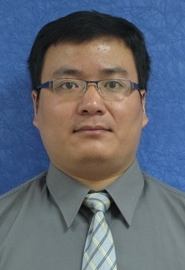
| Professor Kaizhou GaoDepartment of Engineering Science, Macau University of Science and Technology, ChinaKaizhou Gao is an Associate Professor and supervisor of Ph.D. at Macau University of Science and Technology. He obtained his Ph.D. from Nanyang Technological University, Singapore. He serves as an Associate Editor for several SCI journals, including IEEE Trans. ITS, SWEVO, ESWA, and CAEE. He has presided over 10 projects and published over 150 SCI papers in top-tier international journals, including IEEE Trans. TEVC, TCYB, SMC-System, TITS, et al. Among them, more than 10 papers are ESI Hot or Highly Cited Papers. He was listed in the World's Top 2% Scientists in 2021-2025. His academic honors include the Second Prizes of Shandong Provincial Natural Science Award in 2021 and 2023, the 2022 Norbert Wiener Review Award from IEEE/CAA Journal of Automatica Sinica, the Outstanding Paper Award from TSINGHUA Science and Technology, and the 2024 "Research Star" of Macau University of Science and Technology. He has organized over 10 special issues for international journals and special sessions at conferences and delivered 3 invited keynote speeches at international conferences. Speech Title: Learning Guided Swarm Intelligence and Evolutionary Algorithms for Optimization and Scheduling Abstract: This talk will start from introduce the concpets and principle of learning assisted swarm intelligence and evolutionary algorithms. Then, several applications will be explained in detail, including production scheduling problems, and unmanned surface vehicles scheduling problems. After that, a framework of the learning assisted swarm intelligence and evolutionary algorithms will be summaried as a methodology. Finally, some future directions will be supplied. |
| Professor Danyu BaiSchool of Maritime Ecnomics and Management / Dalian Maritime University, ChinaDr. Danyu Bai is a Full Professor and Ph.D. Supervisor at Dalian Maritime University, where he serves as the Director of Logistics and Supply Chain Management Department. He was honored as a Chair Professor of “Chongqing Bayu Scholar program” in 2020. Professor Bai is currently the Expert of National Undergraduate Education and Teaching Assessment, the Council Members of Operations Research Society of China (ORSC) and China Society of Logistics, the Vice President of Scheduling Sub-society of ORSC, and the Deputy Secretary-General of Intelligent Simulation Optimization and Scheduling Committee of China Simulation Federation. His research focuses on Smart Port and Shipping Scheduling, Green Logistics Optimization, Combinatorial Optimization Theory, and Intelligent Optimization Method. He has authored over 50 publications in prestigious journals such as IISE Transactions, IEEE Transactions on Systems, Man, and Cybernetics: Systems, IEEE Transactions on Automation Science and Engineering, Omega, International Journal of Production Research, Swarm and Evolutionary Computation, Computers & Operations Research, Computers & Industrial Engineering, which include 2 highly-cited papers and over 20 JCR Q1 papers, garnering more than 550 citations. He has published two academic monographs, one of which was selected for the State Key Book Publishing Project of the 13th Five-Year Plan, supported by the National Publication Foundation. He has led three projects funded by the National Natural Science Foundation of China. His distinguished achievements include the First Prize for Natural Science Academic Achievement from Liaoning Province (2014), the title of "Outstanding Science and Technology Worker" from the China Simulation Federation (CSF, 2019), the Second Prize of CSF Science and Technology Award for Innovative Technology (2023), and the First Prize of CSF Higher Education Teaching Achievement Award (2025). Additionally, he frequently delivers invited presentations at major academic conferences worldwide. Speech Title: Scheduling Models and Algorithm Analysis for Flow Shop Abstract: Flow-shop scheduling models are widely applied in process industry, discrete manufacturing, and many other fields. With few exceptions, these scheduling problems are NP-hard, implying that finding an optimal solution within polynomial time is infeasible. For large-scale problems, heuristic algorithms based on scheduling rules are designed to quickly obtain approximate solutions, proving their asymptotic optimality. For small-scale problems, effective branch-and-bound algorithms are developed to achieve optimal solutions within a specified time frame. For medium-scale problems, meta-heuristic algorithms are adopted to find satisfactory solutions within a reasonable computational time. |
| Professor Yuxin MaoZhejiang Gongshang University, ChinaDr. Mao Yuxin received his Ph.D. from Zhejiang University, China, in 2008. He is currently a professor at the School of Management and E-Business, Zhejiang Gongshang University. His research interests encompass text mining, online consumer behavior, and social network analysis. Dr. Mao is a senior member of the China Computer Society, a director of the Hangzhou Mobile Internet Technology Society, and an expert member of the AIGC Committee of Zhejiang Artificial Intelligence Association. He has served as a visiting scholar at the Polytechnic University of Valencia and Hong Kong Baptist University. Dr. Mao is recognized as a Third-Level Talent under the 151 Talent Program of Zhejiang Province and was selected for the Youth Science and Technology Talent Cultivation Project of Hangzhou City. In addition to his academic research, Dr. Mao decision-making advisory services to both enterprises and government departments. Speech Title: Mining e-Commerce Consumer Reviews based on LLM Fine-Tuning Abstract: The emergence and popularity of large language models (LLMs), represented by ChatGPT and DeepSeek, has provided a new tool and research perspective for mining e-commerce consumer reviews. By leveraging the capabilities of LLMs through fine-tuning, we can analyze vast amounts of e-commerce consumer reviews, extract valuable insights, and utilize them to support marketing decision-making in e-commerce. Focusing on two key application scenarios—intelligent classification and automatic summarization of e-commerce consumer reviews—we conducted in-depth research to validate the effectiveness of fine-tuned LLMs in review mining, while also comparing this approach with traditional text mining methods. |
| Professor Feng WangWuhan University, ChinaDr. Feng Wang is a Professor and Ph.D. supervisor at Wuhan University. She is a Senior Member of the CCF, serves on the Executive Committee of the CCF Technical Committee on Computational Economics, and is a Standing Committee Member and Deputy Secretary-General of the Intelligent Simulation Optimization and Scheduling Committee of the Chinese Association for System Simulation. Her research interests include intelligent optimization, machine learning, and computational finance. Professor Wang has published over 70 papers in international journals and major conferences, including one ESI Hot Paper and four ESI Highly Cited Papers, and has co-authored two books. She has led several National Natural Science Foundation of China (NSFC) projects and participated in multiple national key R&D programs. Her research has gained wide recognition, and she has been listed among Stanford University’s Top 2% of Global Scientists for five consecutive years. She has received multiple national awards for scientific and educational achievements. . Speech Title: Generative Model Based Strategies for Dynamic Multi-objective Evolutionary Optimization Abstract: Optimization problems in the real world are rarely static because objectives and constraints often change over time. When the problem changes, the Pareto front shifts accordingly. Dynamic multi-objective evolutionary algorithms (DMOEAs) have been developed to address this challenge. This talk presents our recent work on developing generative model-based strategies to enhance the adaptability of DMOEAs in solving dynamic multi-objective optimization problems. Two algorithms are introduced. First, Generative Adversarial Network-based Prediction Strategy (GANPS-DMOEA), uses adversarial learning to extract the high-quality information in new environments and generate populations that respond effectively to environmental changes, supported by a model reuse mechanism for fast adaptation. Second, Diffusion Model-based Dynamic Multi-objective Evolutionary Algorithm (DM-DMOEA), employs diffusion models to learn environmental changes and integrates a variational autoencoder (VAE) to accelerate the response process and achieve a better balance among solution quality, diversity, and efficiency. Finally, some conclusions and future directions will be discussed. |



